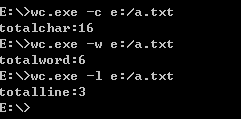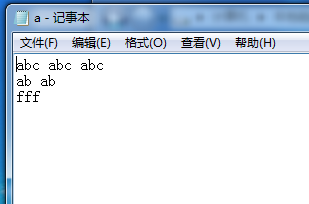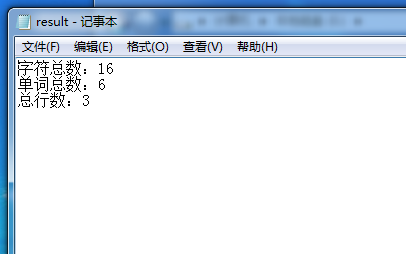WordCount C语言实现求文本的字符数,单词数,行数
1.码云地址:
https://gitee.com/miaomiaobobo/WordCount
2.psp表格
PSP2.1表格
|
PSP2.1 |
PSP阶段 |
预估耗时 (分钟) |
实际耗时 (分钟) |
|
Planning |
计划 |
25 |
20 |
|
· Estimate |
· 估计这个任务需要多少时间 |
10 |
5 |
|
Development |
开发 |
200 |
350 |
|
· Analysis |
· 需求分析 (包括学习新技术) |
25 |
20 |
|
· Design Spec |
· 生成设计文档 |
30 |
20 |
|
· Design Review |
· 设计复审 (和同事审核设计文档) |
20 |
40 |
|
· Coding Standard |
· 代码规范 (为目前的开发制定合适的规范) |
20 |
15 |
|
· Design |
· 具体设计 |
20 |
40 |
|
· Coding |
· 具体编码 |
200 |
300 |
|
· Code Review |
· 代码复审 |
20 |
40 |
|
· Test |
· 测试(自我测试,修改代码,提交修改) |
30 |
60 |
|
Reporting |
报告 |
20 |
20 |
|
· Test Report |
· 测试报告 |
15 |
10 |
|
· Size Measurement |
· 计算工作量 |
10 |
10 |
|
· Postmortem & Process Improvement Plan |
· 事后总结, 并提出过程改进计划 |
20 |
30 |
|
|
合计 |
665 |
950 |
误差分析:本次项目的主要误差存在于具体的编码和开发阶段,因为前期自己对文件的使用不熟悉以及上传到码云的初次接触,导致在这些地方耗费了大量的时间(总计多出200分钟左右)
3.需求功能分析
WordCount的需求:能够通过cmd执行.exe程序,并且传入文本文件,然后对其中的字符数,单词书,行数进行计算,并将结果保存在.exe程序的同级别目录下。
解题思路:1.通过cmd的命令行向main函数中传入操作方式与相应的文件。
2.通过设置flag记录上一个字符是否为空格结合当前是否为空格来判断单词数;
3.判断是否有“\n”来 确定行数。
其中,C语言实现WordCount参考链接:https://www.cnblogs.com/xiaobao123/articles/9649687.html
字符指针数组的空间分配参考链接:https://www.cnblogs.com/mensanu/p/7979462.html
4.程序设计
程序总共包含4个函数(main,countw,countc,countl)其中,main为主函数,通过传入的操作数不同分别调用不同的函数,
主要的模块有:
1.单词数的统计,当遇到空格时,如果上一个字符不是空格,则可判断这是一个新单词
1 while(fgets(buffer, 1003, fp) != NULL){ 2 bufferLen = strlen(buffer); 3 4 for(i=0; i<bufferLen; i++){ 5 c = buffer[i]; 6 if( c==' ' || c=='\t'){ 7 !isLastBlank && wordNum++; //当上一个不是空格,而这一个是空格时单词数+1 8 isLastBlank = 1;//表明一个空格 9 }else if(c!='\n'&&c!='\r'){ 10 11 isLastBlank = 0; 12 } 13 } 14 !isLastBlank && wordNum++;
2.主函数,将cmd的操作指令传入,并通过函数strcmp进行比较,调用不同的函数:
1 int main(int argc,char* argv[]){ 2 char filname[30]; 3 char operation; 4 int totalline;//总行数 5 int toalchar;//总字符数 6 int totalword;//总单词数 7 if(!strcmp(argv[1],"-w")) 8 countw(argv[2]); 9 else if(!strcmp(argv[1],"-c")) 10 11 countc(argv[2]); 12 else if(!strcmp(argv[1],"-l")) 13 countl(argv[2]); 14 return 0; 15 }
5.具体代码(具体代码也可参考码云链接中的.cpp文件)

1 1 #include <stdio.h> 2 2 #include <string.h> 3 3 #include<malloc.h> 4 4 int countw(char *filename); 5 5 int countc(char *filename); 6 6 int countl(char *filename); 7 7 8 8 int main(int argc,char* argv[]){ 9 9 char filname[30]; 10 10 char operation; 11 11 int totalline;//总行数 12 12 int toalchar;//总字符数 13 13 int totalword;//总单词数 14 14 if(!strcmp(argv[1],"-w")) 15 15 countw(argv[2]); 16 16 else if(!strcmp(argv[1],"-c")) 17 17 18 18 countc(argv[2]); 19 19 else if(!strcmp(argv[1],"-l")) 20 20 countl(argv[2]); 21 21 return 0; 22 22 } 23 23 24 24 int countw(char *filename){ 25 25 FILE *fp=NULL; 26 26 FILE *fp2=NULL; 27 27 char buffer[1003]; 28 28 int bufferLen; 29 29 int i; 30 30 char c; 31 31 int isLastBlank = 0; 32 32 int totalword=0; 33 33 int wordNum = 0; 34 34 if( (fp=fopen(filename, "rb")) == NULL ){ 35 35 perror(filename); 36 36 return NULL; 37 37 } 38 38 39 39 while(fgets(buffer, 1003, fp) != NULL){ 40 40 bufferLen = strlen(buffer); 41 41 42 42 for(i=0; i<bufferLen; i++){ 43 43 c = buffer[i]; 44 44 if( c==' ' || c=='\t'){ 45 45 !isLastBlank && wordNum++; //当上一个不是空格,而这一个是空格时单词数+1 46 46 isLastBlank = 1;//表明一个空格 47 47 }else if(c!='\n'&&c!='\r'){ 48 48 49 49 isLastBlank = 0; 50 50 } 51 51 } 52 52 !isLastBlank && wordNum++; 53 53 isLastBlank = 1; 54 54 totalword += wordNum; 55 55 wordNum = 0; 56 56 } 57 57 printf("totalword:%d ",totalword); 58 58 fp2=fopen("result.txt","a"); 59 59 if(fp2){ 60 60 fprintf(fp2,"单词总数:%d\n",totalword); 61 61 fclose(fp2); 62 62 } 63 63 return 0; 64 64 } 65 65 int countc(char *filename){ 66 66 67 67 FILE *fp=NULL; 68 68 FILE *fp2=NULL; 69 69 char buffer[1003]; 70 70 int bufferLen; 71 71 int i; 72 72 char c; 73 73 int isLastBlank = 0; 74 74 int totalchar=0; 75 75 int charNum = 0; 76 76 if( (fp=fopen(filename, "rb")) == NULL ){ 77 77 perror(filename); 78 78 return NULL; 79 79 } 80 80 while(fgets(buffer, 1003, fp) != NULL){ 81 81 bufferLen = strlen(buffer); 82 82 for(i=0; i<bufferLen; i++){ 83 83 c = buffer[i]; 84 84 if( c==' ' || c=='\t'){ 85 85 isLastBlank = 1;//字符不统计空格 86 86 }else if(c!='\n'&&c!='\r'){ 87 87 charNum++; 88 88 isLastBlank = 0; 89 89 } 90 90 } 91 91 92 92 isLastBlank = 1; 93 93 94 94 totalchar += charNum; 95 95 96 96 charNum = 0; 97 97 98 98 } 99 99 printf("totalchar:%d",totalchar); 100 100 fp2=fopen("result.txt","a"); 101 101 if(fp2){ 102 102 fprintf(fp2,"字符总数:%d\n",totalchar); 103 103 fclose(fp2); 104 104 } 105 105 return 0; 106 106 } 107 107 108 108 int countl(char *filename){ 109 109 FILE *fp=NULL; 110 110 FILE *fp2=NULL; 111 111 char buffer[1003]; 112 112 int bufferLen; 113 113 int i; 114 114 char c; 115 115 int totalline=-1; 116 116 if( (fp=fopen(filename, "rb")) == NULL ){ 117 117 perror(filename); 118 118 return NULL; 119 119 } 120 120 121 121 while(fgets(buffer, 1003, fp) != NULL){ 122 122 bufferLen = strlen(buffer); 123 123 for(i=0; i<bufferLen; i++){ 124 124 c=buffer[i]; 125 125 if(c=='\n'||c=='\r'){ 126 126 totalline++; 127 127 128 128 } 129 129 } 130 130 } 131 131 printf("totalline:%d",totalline); 132 132 fp2=fopen("result.txt","a"); 133 133 if(fp2){ 134 134 fprintf(fp2,"总行数:%d\n",totalline); 135 135 fclose(fp2); 136 136 } 137 137 return 0; 138 138 139 139 }
6.本程序的测试
cmd测试命令行:

待测试的文件:

处理的结果:

7.个人项目总结
本次项目,学到的很多新知识。但是在项目开始的时候,我本来对文本的处理不是很熟悉,所以在这方面花费了很多时间,之后通过cmd运行可执行文件也耗费了我大量的时间。所以,这个项目虽然实现的功能比较简单,但总的花费我差不多一天的时间,但收获也是巨大的,也明白了自己的不足。项目本身存在着一些缺陷,包括对错误操作的提示不足,只能进行单一文件处理等,都需要改进。
8.参考资料
1.C语言实现WordCount参考链接:https://www.cnblogs.com/xiaobao123/articles/9649687.html
2. 字符指针数组的空间分配参考链接:https://www.cnblogs.com/mensanu/p/7979462.html
3.%s在c语言中对于空格的处理 : http://bbs.bccn.net/thread-352772-1-1.html
4.git的使用:https://www.liaoxuefeng.com/wiki/0013739516305929606dd18361248578c67b8067c8c017b000/




 浙公网安备 33010602011771号
浙公网安备 33010602011771号